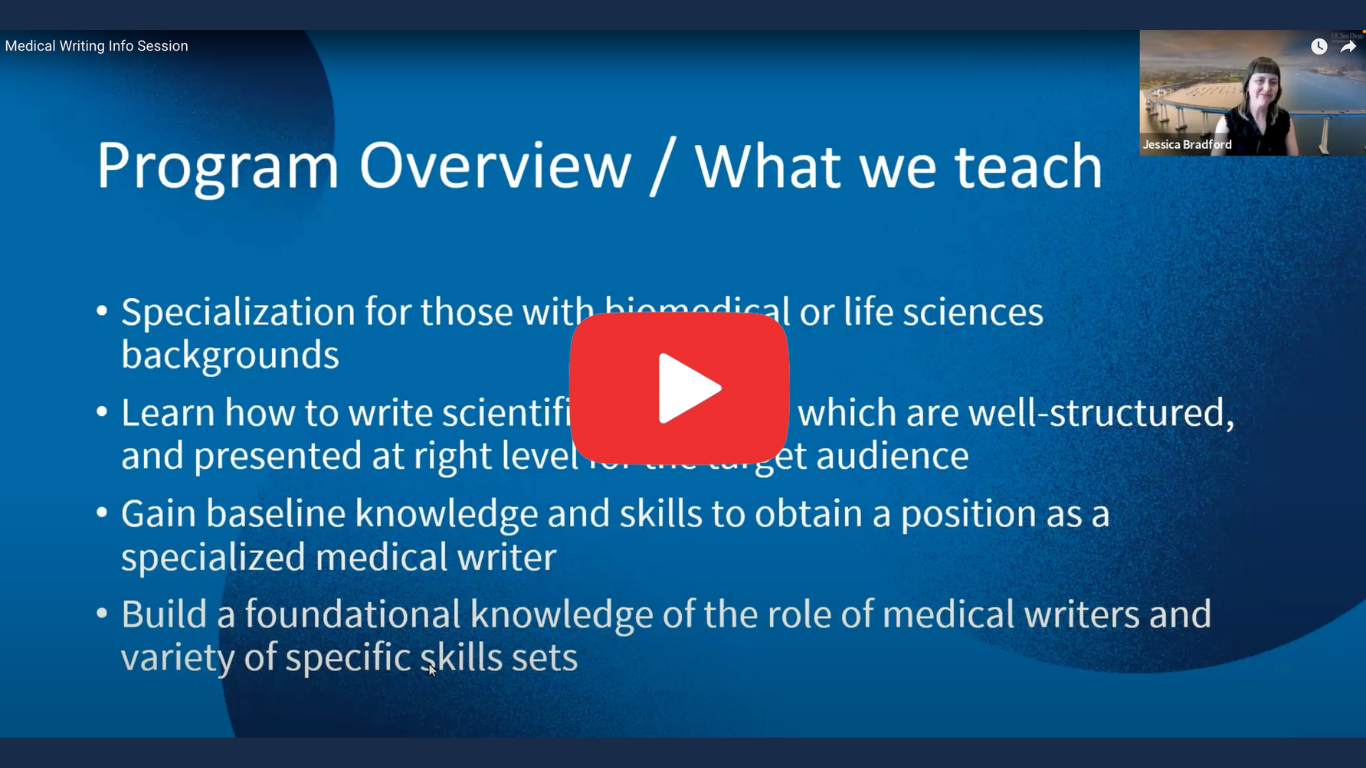
About the Medical Writing Program
The demand for medical writers is growing across industries, and many biomedical and life sciences PhDs seek careers beyond academia. With UC San Diego Extended Studies’ strong ties to the biotech industry—part of the world’s third-largest biotech cluster—the Medical Writing Certificate Program was created. Guided by an expert Advisory Board, this program equips biomedical and life sciences graduates with the essential skills to launch careers in medical writing across the commercial sector, government agencies, and academia.
Scientific Medical Writing vs. Non-Scientific Medical Writing
The program is not designed for those intending to communicate scientific information to lay audiences, e.g., science journalism, marketing communications or patient communications. This program is designed to equip scientists and others with a strong biomedical and/or life sciences background to write for scientific audiences in peer-reviewed journals, regulatory documents, medical education materials and/or research grant proposals.
The program is designed for anybody aspiring to be medical writers and/or editors. Accepted applicants will:
- likely have degrees in biomedical or life sciences, such as biology, chemistry, pharmacy, nursing, nutrition, or public health
- often have advanced degrees, including PhD’s (candidates with PhDs are particularly competitive for medical writing positions in the commercial sector and academic settings)
Demand and Job Prospects
- Medical writing offers a rewarding and intellectually stimulating career, with six-figure salaries for senior writers.
- Many medical writers manage their own freelance businesses.
- Few Biology PhDs on university campuses will secure a faculty position or campus laboratory; medical writing provides an alternative well-paying career.
- According to the most recent American Medical Writers Association (AMWA) data, increases in medical writers’ salaries were more than double the rate of inflation and increased through certification.
- Per the Bureau of Labor Statistics, demand for Technical Writers in Healthcare is projected to grow nearly 27% from 2012 to 2022.
Program Cost, Duration & Expectations
Students can finish the 16-unit program in 9-12 months. The overall cost is approximately $4,000+/- (cost will vary based on electives taken). Students MUST earn a minimum passing grade of a B-/80% in every course of the Medical Writing Certificate Program.
Highlights & Benefits
Key Program Highlights:
- 100% online specialization for those with biomedical and/or life sciences backgrounds
- Gain baseline knowledge and skills to obtain a position as a specialized medical writer
- Capstone tracks: Regulatory Writing, Journal Article and Publication Development, or Medical Education Materials (CME)
Program Benefits:
- Gain practical hands-on training with leading Medical Writing and Editing industry practitioners;
- Build a foundational knowledge of the role of medical writers and a variety of specific skills sets;
- The demand for trained writers in healthcare is growing and medical writers’ salaries are more than double the rate of inflation and increase with professional certification;
- Career offers flexibility and provides six-figure salaries for senior writers;
- Many medical writers manage their own freelance businesses and it is an attractive well-paying alternative career path for recent PhDs who do not secure a faculty position;
- Incorporation of new topics, medical concepts and industry best practices;
- Learn how to write scientific documents which are well-structured, and presented at right level for the target audience
Who should take the certificate?
Developing professionals currently working in the healthcare ecosystem who want to boost their current career or transition into a Medical Writing role. Accepted applicants will have graduate degrees in biomedical or life sciences, such as biology, chemistry, pharmacy, nursing, nutrition, medicine or public health. Postdocs and those with PhDs are particularly competitive for medical writing positions in the commercial sector and academic settings.
.png)
Medical Writing
Recommended Prerequisites
Required Courses (10 units)
Electives (6 units required)
Capstone Project (Optional)

Visit The Virtual Career Hub Today To Unlock Your Benefits!
Conditions for Admission
Successful applicants must have relevant educational background, and native-level fluency in English with the demonstrated ability to write clear, logical, and grammatically correct sentences as evidenced by the application, official transcripts and writing samples. Accepted applicants will have degrees in biomedical or life sciences, such as biology, chemistry, pharmacy, nursing, nutrition, or public health. It is anticipated that many will have advanced degrees, including PhDs. Candidates with PhDs are particularly competitive for medical writing positions in the commercial sector and academic settings.
Certificate Guidelines
The following prerequisites are recommended for students pursuing the Medical Writing certificate:
- Medical Terminology FPM-40172, 1 unit online
- Practical Clinical Statistics for the Non-Statistician FPM-40233, 2 units online
- Grammar Lab WCWP-40234, 3 units online
- Clinical Trials and Regulatory Writing Primer, FPM-40672, 1 unit online
Next Steps Experience
Connect your classroom education with real-world experiences through a Next Step Experience course. These specially designed classes allow students to gain hands-on experience by working closely with instructors and/or peers on real-world projects. In the Capstone course, students will apply all previously learned concepts to work through one or more projects in one of the four pre-identified Medical Writing areas.
The purpose of the Capstone is to:
- Gain hands on experience of researching information, and analyzing, interpreting, and communicating data as would be expected of a Medical Writer. The final project(s) will be submitted for critical review by the advising faculty leader
- Have a clear sense of the critical behaviors and practical work practices that make the student a better Medical Writer.
- Identify areas of continued improvement moving forward to hone knowledge and skill in the evolving Medical Writing profession.
To be eligible to take this course, you must have completed all of the other courses in the Medical Writing program with a B-/80% or higher.
Capstone: Journal Article and Publication Development (FPM-40630)
Capstone: Medical Education Materials (FPM-40627)
Advisory Board
Noelle Demas
Timothy Mackey, MAS, PhD
Michelle Beauclair
Tim Collinson, BSc (hons), ISMPP CMPP
Thomas Gegeny, MS, ELS, MWC, CMPP
Related Programs

Healthcare Revenue Cycle

Science Communication


.png)
